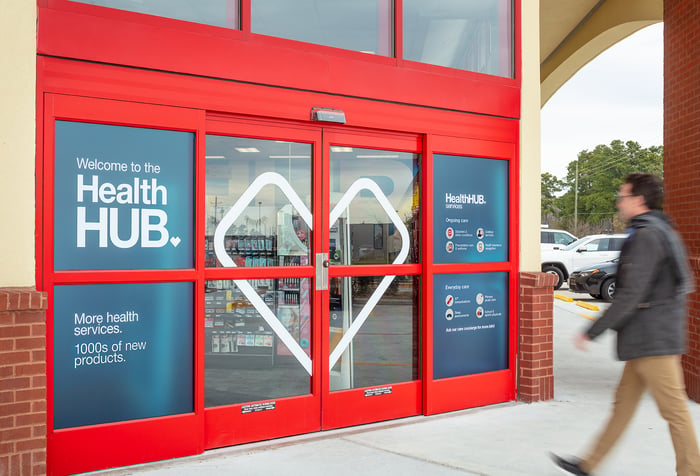Just being a pharmacy -- even a modern one that sells everything from healthcare supplies to food, as-seen-on-TV products, and who knows what else -- may not be enough to survive the retail apocalypse. Consumers can get nearly anything online that they could pick up at a CVS Health (CVS 1.34%) or Walgreens (WBA 1.79%), so the drugstore chains need to adapt.
CVS has started that transformation with its HealthHUBs, locations that offer classes, community events, and a healthcare concierge. The idea is to give consumers a reason to visit its stores.
Now, Walgreens has its own answer to CVS. It has launched Feel More Like You, a program that combines the chain's pharmacy, health, and beauty departments to help cancer patients. All Walgreens pharmacists and beauty consultants involved in the program will be trained in not just meeting customer needs but also in having empathy for them.

CVS and Walgreens are both making major changes. Image source: CVS.
What is Walgreens doing?
Basically, Walgreens' management understands that it can no longer just sell products. To succeed -- and to give people a reason to visit -- it needs to offer something a digital retailer can't. For Feel More Like You, the company has partnered with the nonprofit Cancer Support Community to train its workforce in understanding the needs of cancer patients.
"Cancer is the least treatable but the most diagnosed illness today," said Walgreens Group Vice President Lauren Brindley, during a session at Future Stores Seattle recently, RetailWire reported. "We've already had 15,000 services since the campaign launched, and we're going to have to continue to show up consistently."
Like CVS, Walgreens clearly sees that at least part of its current and future reason for being will be offering services. Teaching its employees to be empathetic to people facing a challenging illness is a part of that -- and it also seems like something that should have been done long before now.
HealthHUB offers specific education for people dealing with chronic illnesses, including diabetes and high blood pressure, while also offering classes in nutrition as well as other areas. CVS is currently rolling the concept out to 1,500 locations. Walgreens has already trained 15,000 employees as part of its program, which it expects to formally expand to include health issues beyond cancer.
Are these good moves?
Healthcare is personal, and it's perplexing that CVS and Walgreens needed business pressure to make these sorts of moves. You can order healthcare and beauty products online. What you can't get is personalized service that not only understands your specific needs but also offers specific training in empathy and understanding.
Both CVS and Walgreens want to be more than stores. They want to create relationships -- kind of like the ones people had with local pharmacies before national chains replaced them.
For any retailer to survive the retail apocalypse, it has to have a reason to justify its brick-and-mortar locations. CVS and Walgreens are taking steps to give consumers a reason to visit. That's a major change for both chains, which had previously operated on a model through which customers needed to visit their stores.
Walgreens deserves credit for committing to making empathy a cornerstone of its business. That's something any business that deals with people when they're vulnerable should consider.
These moves are just starts for both chains. Still, they show that decision-makers for both companies understand that the retail landscape has changed greatly, and will continue to change.





